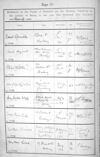|
|
HENRY GRAHAM MIDGLEY
THE LATE MR. GRAHAM MIDGLEY TRAGIC END TO A LIFE OF PROMISE
Peculiarly sad and tragic circumstances are associated with the death of Mr. Graham Midgley, who is well known in Newbury. An engineer by profession, he was apprenticed at Messrs. Plenty's upon leaving school, and since the war has been engaged with a firm of consulting engineers in Victoria-street, Westminster. In September last he married Miss Nora New, second daughter of Mr. W.G. New, of Newlands, Porchester-road, and he had hardly returned from his honeymoon and taken his bride to her new home when he had a break-down in health. By medical advice he went to the National Hospital, Queen's Square, Bloomsbury, and it was feared at first that he had a tumour on the brain. Unhappily this proved only too true, and he died on Friday under an operation. A promising life has thus been cut short, for the deceased, who was only 28 years of age, would have gone far in his profession. He was conscientious and painstaking, and his death is a loss to the community, for such men as he are the life blood of the country. The deepest sympathy is felt with the widow and relatives in their great sorrow.
An Appreciation
I only came to know Graham Midgley intimately, writes a friend, when I had the good fortune to find myself in the same platoon with him in the 19th Royal Fusiliers, in the early days of the war. I quickly discovered in him the best of comrades and the cheeriest of companions. He was a man of great strength, both in character and physically, but I never knew him use his strength except to help his fellows. Those were the days of long route marches, 20 miles and over, and many a time have I seen "Midge" take a rifle from a boy who was tired out, and carry it himself, as well as his own. Then when we got to France it was just the same. I remember in December, 1915, going into Festubert trenches. It was in the dead of night, and we had to cross a morass. Every step one sunk into the slimy, holding stuff, thigh deep. There was one lad quite exhausted. He could not go any further, and said: "Let me stay here." Somehow Midgley managed to drag him that awful stuff into the front line trench. And what a trench! We were standing thigh deep in water, five days of it, and it was here that he contracted trench feet, through which he was invalided home. I was standing next to him, and every day he used to say, "Uncle, let me rub your feet," and I would sit on the fire step, take off my putties and boots, and he would chafe them until circulation came back. He always refused a similar service himself, saying he was strong enough, and would take no hurt, but the day after we got back to the second line I saw him in the forward dressing station, lying on a stretcher, ticketed for "Blighty." He never really recovered from his trench feet, and it was this that prevented him from getting a commission, which must have been a great blow to him, for he was a keen soldier, and loved the Army. He loved manly sports, and Newbury has known few better boxers, long distance cyclists, or swimmers. Many is the time before the war he has cycled to his home in London after work, and back to Newbury on the morning in time to start again. We who had the privilege of serving by his side will treasure his memory as a true comrade, and our sympathy goes out to his loved ones, whose sorrow is greater than we can fathom.
The Funeral
The funeral took place yesterday (Wednesday) at the Old Cemetery, Newtown-road, and was attended by many friends as well as relatives. The body had been brought from London by motor-hearse, and a short service, at which the relatives only were present was held in the house at Newlands, being conducted by the Rev. Percy Young and the Rev. A. Barrett Gowers.
The mourners present at the cemetery were his mother, Mrs. Midgley, Miss Edith Midgley (sister), Mrs. F.J. Martin (aunt), Mr. W.G. New, Miss Gertrude New, Miss Phyllis New, Mr. Alderman Stradling (an old friend), Messrs A.A. Barrett, G.L. Parker and Hugh Turner (former comrades in the 19th Royal Fusilier), Miss May Day, Miss Gladys Day, whilst amongst those also noticed present were the Mayor and Mayoress (Mr. and Mrs. George Griffin) Mr. Harold Griffin, Mr. J. H. Thompson, Miss Violet Thompson, Mrs. E. C. Midwinter, the Rev. J. H. Green, Mr. Harold Davis, Mr. Paul Hopson, Mr. Danford Skinner, Mr. Councillor Love, Mr. J. Lucas, Mrs. Lucas, Miss Bishop, Mr. A.G. Lovegrove
It was quite a plain coffin, the name plate bearing the inscription:
Henry Graham Midgley died 29th January 1921 aged 28
There was a large number of wreaths, the public ones including a chaplet of laurel leaves and arum lilies, tied with the regimental colours from his old comrades the 19th Fusiliers, one from the staff at the Eagle Iron Works, one from former companions at the Kings-road Works, and from the Newbury Primitive Methodist Church Trustees. The senders of private ones were his heart-broken wife, his mother and sister, loved ones at Newlands, Aunt Sarah and Uncle Will etc.
Newbury Weekly News 3 February 1921
Mrs P. p.1 no. 8
Buried 8 February 1921 Bk 1917 p. 050 no. 9997 |



